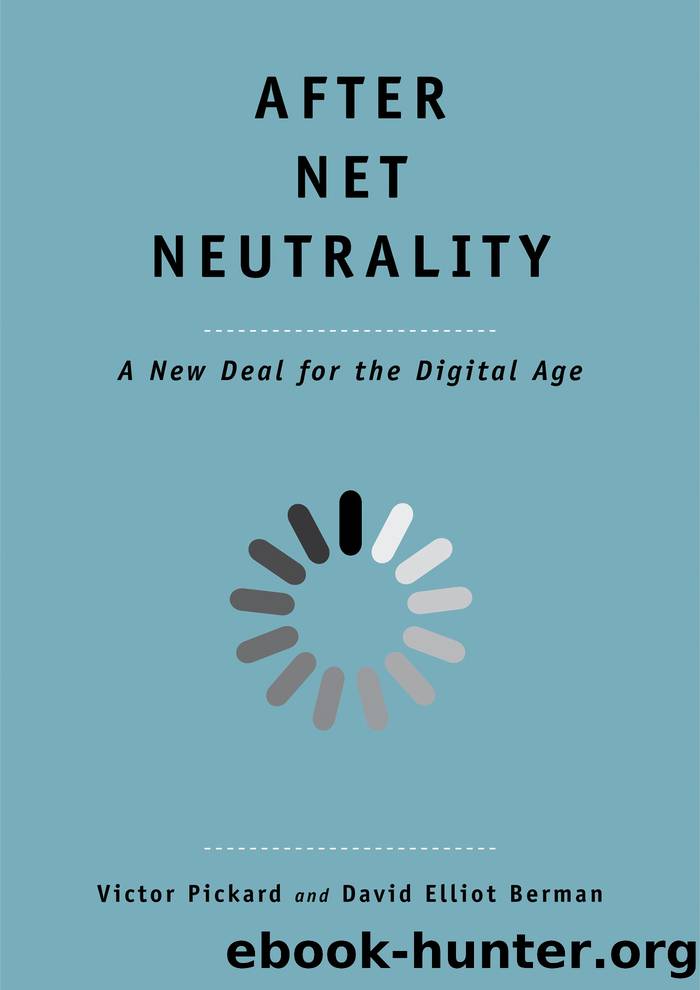After Net Neutrality by Victor Pickard;David Elliot Berman;

Author:Victor Pickard;David Elliot Berman;
Language: eng
Format: epub
Publisher: Yale University Press
Published: 2019-01-15T00:00:00+00:00
Net Neutrality in the Age of Trump
In recent history, few policies have enjoyed greater support than net neutrality. On December 12, 2017, the Program for Public Consultation at the University of Maryland released a poll showing that a large majority of Americans wanted to keep net neutrality rules in place. According to the poll, 83 percent of the respondents opposed repealing net neutrality, including 75 percent of the Republicans who were surveyed, 89 percent of Democrats, and 86 percent of independents.36 Two days later, the FCC voted to repeal net neutrality in a 3â2 party-line decision. That such a popular piece of legislation would be repealed under the aegis of a âpopulistâ president who ran on a pledge to âdrain the swampâ is something of a tragicomedy. Indeed, Donald Trumpâs approach to internet and telecommunications policy is thus far largely indistinguishable from the Republican old guard.
With the election of Donald Trump to the presidency on November 8, 2016, the fate of the FCCâs 2015 Open Internet Order was immediately imperiled. In a last-ditch effort to preserve net neutrality, a familiar coalition of advocacy organizationsâincluding Fight for the Future, Free Press, Demand Progress, and the Center for Media Justiceâcoordinated the Internet-Wide Day of Action to Save Net Neutrality on July 12, 2017. The coalition employed many of the same tactics that participants used during the Internet Slowdown Day in 2014, including temporarily changing their websites to simulate what the internet could look like without net neutrality. For example, internet users who visited Reddit on the Day of Action were greeted with a message typed in a crawling speed that read: âThe internetâs less fun when your favorite sites load slowly, isnât it?â On the top left-hand corner of the website, Redditors inserted the mildly dystopian warning: âMonthly Bandwidth Exceeded, Click to Upgrade.â37
Meanwhile, Chairman Pai took to the internet for some activism of his own. Dressed in a Santa suit and wielding a lightsaber, he starred in a bizarre video produced by the conservative news site The Daily Caller entitled 7 Things You Can Still Do on the Internet After Net Neutrality. The video stunt was met with immediate contempt by the digital public. On Twitter, the actor who played Luke Skywalker in the Star Wars film series, Mark Hamill, cracked that Pai was âprofoundly unworthy [to] wield a lightsaberâ because âa Jedi acts selflessly for the common manâNOT lie [to] enrich giant corporations.â38 Paiâs streak of bad publicity worsened when it was revealed that he had collaborated on the video with a producer named Martina Markota, best known at the time for having helped propagate âPizzagate,â a conspiracy theory that Hillary Clinton and other high-ranking Democratic officials were operating a child-trafficking ring out of the basement of a dingy Washington, DC, pizzeria.39
Many of the large tech companies that were at the helm of previous actions to defend net neutrality distanced themselves from the 2017 protests. Googleâs participation was limited to a short, poorly publicized blog post on its policy blog. Facebookâs
Download
This site does not store any files on its server. We only index and link to content provided by other sites. Please contact the content providers to delete copyright contents if any and email us, we'll remove relevant links or contents immediately.
You Don't Own Me by Orly Lobel(1362)
Intellectual Property Strategy by John Palfrey(1317)
Hello, My Name is Awesome by Alexandra Watkins(1286)
Without Copyrights by Spoo Robert(1182)
Profit From Your Idea: How to Make Smart Licensing Deals by Attorney Richard Stim(1161)
Democracy of Sound by Alex Sayf Cummings(1147)
A Triumph of Genius: Edwin Land, Polaroid, and the Kodak Patent War by Ronald K. Fierstein(1117)
The Trademark Guide by Lee Wilson(1116)
World War 3.0 by Ken Auletta(1082)
The Copywriter's Handbook by Robert W. Bly(1075)
Data Protection: A Practical Guide to UK and EU Law by Carey Peter(1066)
Kafka's Last Trial by Benjamin Balint(1060)
BVR's Guide to Intellectual Property Valuation by Michael Pellegrino(1011)
Mass Media Law by Pember Don & Pember Don(997)
Patent It Yourself: Your Step-by-Step Guide to Filing at the U.S. Patent Office by Pressman David Attorney(994)
Hello, My Name Is Awesome: How to Create Brand Names That Stick (BK Business) by Alexandra Watkins(989)
What They'll Never Tell You About the Music Business by Peter M. Thall(989)
The Tech Contracts Handbook: Software Licenses and Technology Services Agreements for Lawyers and Businesspeople by David Tollen(981)
The New Censorship: Inside the Global Battle for Media Freedom by Joel Simon(950)
